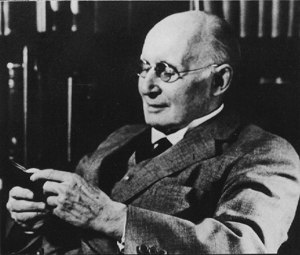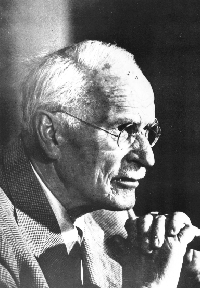PIERRE TEILHARD DE CHARDIN
CONGENIAL THINKERS
|

|
1. Alfred North Whitehead (1861-1947)
He was a trained mathematician and almost all his writings concerned mathematics, symbolic logic, physics and the philosophical implications of the mathematical and physical sciences before he moved to the United States. In 1942 Harvard University invited him to join its faculty of philosophy. In his Harvard period Whitehead published seven books in which he worked out and refined his philosophy. He felt it necessary to turn to metaphysics in a time that was deeply suspicious of such thought and even questioned its very possibility. From his works we mention: "The principle of reality" (1922), "Science and the modern world" (1925), "Religion in the making" (1926), Process and reality" (1929), "The aims of education" (1929), "Adventures of ideas" (1933), "Modes of thought" (1938).
|
|

|
2. Carl Gustav Jung (1875-1961)
As a Swiss psychiatrist, he broke with Freud's psycho-analysis. He gave depth psychology a direction, which he called 'analytic psychology' and in which the concept 'libido' got the meaning of general vitality. In this concept religious feelings have also a positive meaning (contrary to Freud's theory). By seeing the individual consciousness in relation to the collective consciousness, Jung and Teilhard show many similarities. Teilhard was a palaeontologist and a mystic. Jung was a psychologist and a mystic too. Teilhard was focussed on relation between physics and religion. Jung' focus was the relation between psychology and religion. From his works we only mention: "The secret of the golden Flower" (with Wilhelm, 1929), "Modern Man in Search of a Soul" (English translation 1933), "Essays on Contemporary Events" (Eng. trans. 1947), "Answer to Job" (Engl. trans. 1954),"Memories, dreams, reflections" (Eng.trans.1963), "Man and His Symbols" (Eng. trans. 1964).
|
|
The Sixteenth International Teilhard Conference at All Saints Pastoral Centre, London Colney, from 18 till 20 April 1997 was devoted to "Jung and Teilhard - An exploration in Complementarity". Lectures were held there by:
- Mrs.Emily Binns Ph.D. from the Villanova University in Pennsylvania
- Mr. Siôn Cowell, lecture 'Teilhard and Jung'
- Mr. Robert Faricy S.J.
- Mr. Fabio Mantovani, the president of the Italian Teilhard Association
- Mr. John Woodcock
|

|
|